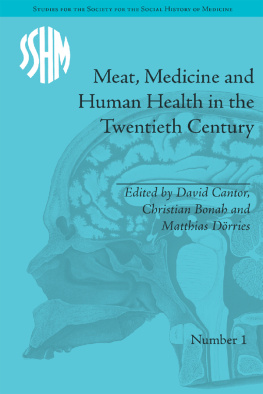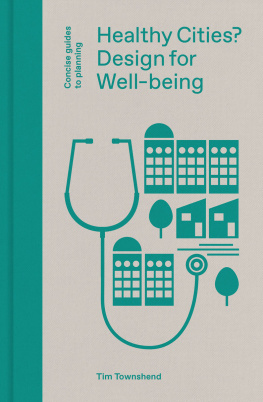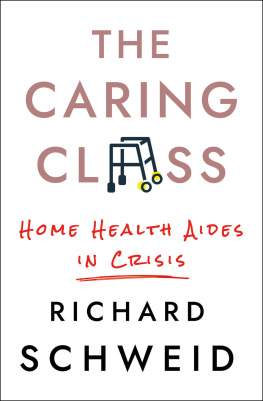A History of Euphoria
Very few people have not at some point in their lives believed themselves or their loved ones to be reasonably healthy when sickness was encroaching or never went away. Health has been deceiving us for millennia, but rarely have we entirely dispensed with it as a concept. This book sets out to establish why and how that might be. The first of its kind, this longue dure historical study explores some of the ways in which people in western societies and cultures have come to believe that they, or other people, have perceived or misperceived health, well-being and euphoriaa word which, before the twentieth century, usually named the experience of health. This book draws from a number of areas of historical research, including the histories of convalescence, addiction, madness and Sigmund Freuds interest in Euphorie in his pre-psychoanalytical period.
Christopher Milnes is an early career scholar and History tutor based in London.
Routledge Studies in Cultural History
Historical Memory of Central and East European Communism
Edited by Agnieszka Mrozik and Stanislav Holubec
War Experience and Memory in Global Cultures Since 1914
Edited by Angela K. Smith and Sandra Barkhof
Libraries, Books, and Collectors of Texts, 16001900
Edited by Annika Bautz and James Gregory
Monsters and Borders in the Early Modern Imagination
Edited by Jana Byars and Hans Peter Broedel
The Enlightenment, Philanthropy and the Idea of Social Progress in Early Australia
Creating a Happier Race?
Ilya Lazarev
The Transatlantic Genealogy of American Anglo-Saxonism
Michael Modarelli
Anxieties of Belonging in Settler Colonialism
Australia, Race and Place
Lisa Slater
Families, Values, and the Transfer of Knowledge in Northern Societies, 15002000
Edited by Ulla Aatsinki, Johanna Annola, and Mervi Kaarninen
A History of Euphoria
The Perception and Misperception of Health and Well-Being
Christopher Milnes
For more information about this series, please visit: www.routledge.com/Routledge-Studies-in-Cultural-History/book-series/SE0367
First published 2019
by Routledge
52 Vanderbilt Avenue, New York, NY 10017
and by Routledge
2 Park Square, Milton Park, Abingdon, Oxon, OX14 4RN
Routledge is an imprint of the Taylor & Francis Group, an informa business
2019 Taylor & Francis
The right of Christopher Milnes to be identified as author of this work has been asserted in accordance with sections 77 and 78 of the Copyright, Designs and Patents Act 1988.
All rights reserved. No part of this book may be reprinted or reproduced or utilized in any form or by any electronic, mechanical, or other means, now known or hereafter invented, including photocopying and recording, or in any information storage or retrieval system, without permission in writing from the publishers.
Trademark notice: Product or corporate names may be trademarks or registered trademarks, and are used only for identification and explanation without intent to infringe.
Library of Congress Cataloging-in-Publication Data
Names: Milnes, Christopher, author.
Title: A history of euphoria : the perception and misperception of health and
well-being / by Christopher Milnes.
Description: New York : Routledge, 2019. | Series: Routledge studies in
cultural history ; 67 | Includes bibliographical references and index.
Identifiers: LCCN 2018046045 (print) | LCCN 2018046880 (ebook) |
ISBN 9780429028298 (ebook) | ISBN 9780367137229 (hbk) |
ISBN 9780429028298 (ebk)
Subjects: MESH: Euphoria | Attitude to Health | History of Medicine |
Psychiatryhistory
Classification: LCC RA441 (ebook) | LCC RA441 (print) |
NLM BF 575.E5 | DDC 362.1dc23
LC record available at https://lccn.loc.gov/2018046045
ISBN: 978-0-367-13722-9 (hbk)
ISBN: 978-0-429-02829-8 (ebk)
Typeset in Sabon
by Apex CoVantage, LLC
To my parents
Contents
PART I
The Perception of Health
PART II
The Misperception of Health
PART III
The Misperceiving Other
PART IV
Euphoria
PART V
The Misperception of Well-Being
Guide
This book began as a PhD research project in 2009. I wanted to explore the meaning of euphoria. There had been histories of happiness, ecstasy and joy. Very little, however, of euphoria. The Ancient Greek etymology of this word fascinated me: Bearing or carrying well. A designation for any human being, for surely we are all bearing and carrying. To be euphoric, at least at some point in human history, meant to exist as a burdened creature: and to be judged, by people who believed they could make such judgements, to be bearing the burden well. As the years flew by, the doctoral project became a thesis about the pleasure of medical recovery: euphoria, at certain points in its history, sometimes named such an experience. And then, at last, the thesis became a book about the ways in which people perceive and misperceive their health and well-being (or good existence) and the health and well-being (or good existence) of others, the ideas and the words that help them to create meaning in a world where, fundamentally, such experiences are not wholly understandable. What began as a study of euphoria has become a history of living well or, more precisely, a history of knowing (and not knowing) that we and the people we care about are living well. Healthy, we hope, and good.
That is, perhaps, everybodys preoccupation. Still, I find it curious that I seem to have found an aspect of myself in the following pages that I could never have expected. When I was very young, I fell in love with someone who was sometimes very sick, and who would never be completely better. He lived far away from me. Even when he was close, however, I never was entirely sure exactly how he was. Much of this book has to do with the uncertainty we sometimes feel for the health and well-being of ourselves and the ones we love; and with the little reassurances we have created, which can work against this uncertainty: those moments, we have told ourselves, when our health and well-being and that of the people we care about seems to come into wonderful focus. The wish to perceive with clarity and thus know with certainty that we and our loved ones are healthy and existing well is the wish that appears to drive this history, sometimes moving against the things in our societies, cultures and medicines that seem to tell us that we really cannot perceive and know.
This wish is, perhaps, attractive and universal enough to be called a force. Does it drive medicine? Does it drive every human thing? Euphoria is part of it. This word in Ancient Greece could express considerable joy, and it seems to have been rooted in joy: the celebratory judgement of good existence, and even sometimes health, in a world of endless burdens. The meaning of euphoria has changed across the centuries, but I have found that this word still ultimately emerges as part of our perception of the condition of ourselves and others, and our wish to know that we and the people we care for are okay. It has taken many years and a much rewritten book for me to explain to myself what I mean by this. Still, I guess that is where my initial interest in the word and particularly its etymology must have come from. The writer Alan Bennett has said that you dont put your life into your books. You find it there (Bennett 2008, 102). I am bound to agree with him.









